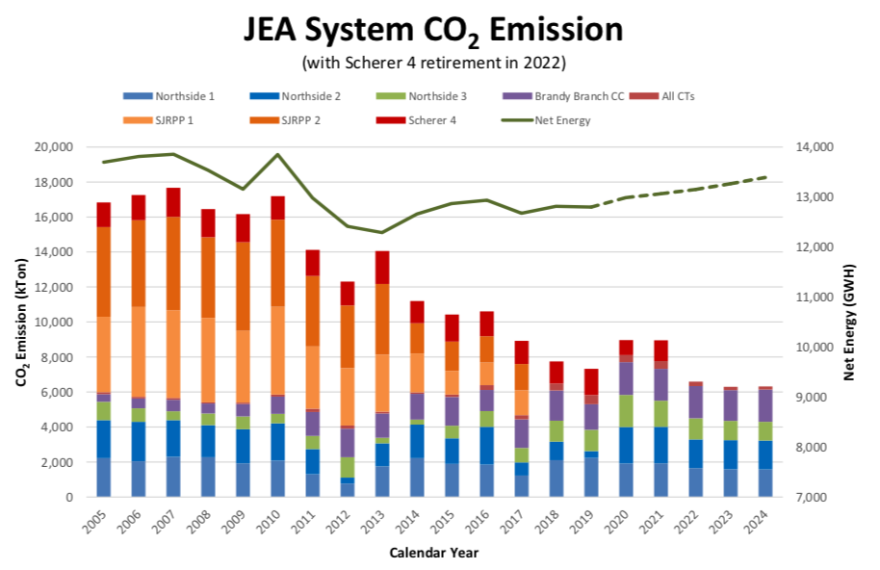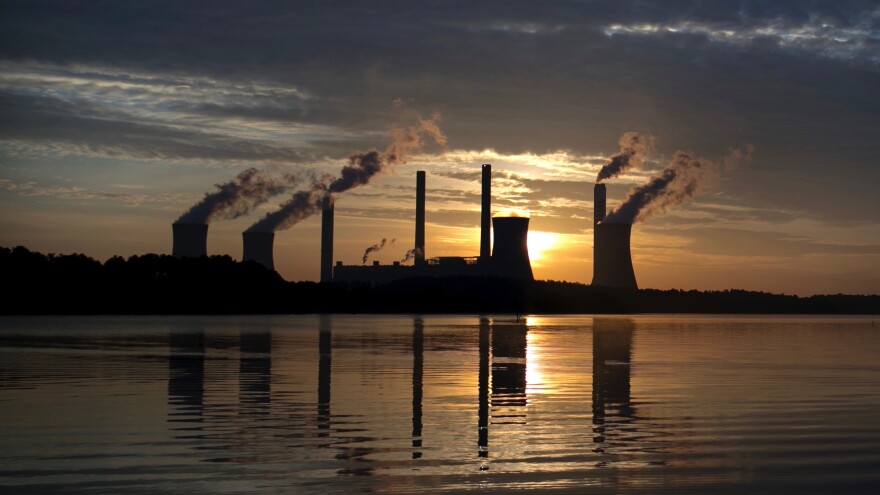The JEA Board of Directors unanimously approved a transaction on Friday that will lead to the closure of one unit at the coal-fired Scherer power plant in Georgia, which is one of the single largest point sources of carbon emissions in the country.
Plant Scherer, Unit 4, near Macon, GA, is operated by the Georgia Power Company, but has been jointly owned by JEA and Florida Power & Light Company since 1989. JEA holds 24% ownership (about 198 megawatts) and FPL owns the remaining 76%.
The Robert W. Scherer Generating Facility is one of the single largest sources of carbon dioxide emissions at a single location in the country, emitting more than 16 million tons of CO2 in 2018 (the most recent year data is available for), according to the U.S. Energy Information Administration (EIA). The plant has been under investigation for groundwater contamination from toxic coal ash.

The transaction approved by the board includes JEA entering into a 20 year purchase power agreement (PPL) with FPL for natural gas. The natural gas price for the first ten years will be fixed with an option to switch to solar energy for the last ten years.
“This has been a successful mutually beneficial partnership and is just one of such joint asset ownership and operating agreements between JEA and FPL, including the St. Johns River Power Park and 500kv [kilovolt] transmission lines,” said Paul McElroy, JEA interim CEO and Managing Director. “While the past several years have presented challenges and difficult circumstances, with the JEA sale process over and behind us, the time is right to focus on future operating partnerships. We continue to create value for both utilities and extend our strong operating relationship with FPL.”
According to JEA, switching from the coal-fired power unit to natural gas will reduce costs by about 33%, potentially saving the electric authority $191 million over the life of the PPL.
On top of that, JEA estimates that switching to natural gas will reduce carbon emissions by about 1.3 million tons every year.

"We are happy to see JEA's unanimous decision to divest from the nation's largest coal plant,” said Janet Stanko, Chair of Sierra Club’s Northeast Florida group. “CEO Paul McElroy recognized that the power from Plant Scherer was the highest cost in the utility's portfolio, a trend that has been happening across the country. Coal is the dirtiest fuel for electricity generation in pollutants and carbon emissions. We are particularly happy about this decision as the urgency to retire coal rises every day as we deal with the devastating impact of climate change and we are particularly happy to see that there is the option to increase JEA's solar potential as part of the power purchase agreement."
According to the EIA, at 75%, carbon dioxide emissions from fossil fuel combustion are by far the most common form of climate change causing greenhouse gasses.

However, natural gas is still a fossil fuel.
Natural gas does emit as much as 60% less CO2 than coal, but its drilling and extraction results in the leakage of methane, a primary component of natural gas that’s 34 times more potent than CO2 when it comes to trapping heat over a 100-year period and 86 times stronger over 20 years, according to the Union of Concerned Scientists.
The EPA estimates that methane is leaked at a rate of 1.4% for electric generation from drilling sites to power plants.
However, a recent study found that methane leaks were twice as big as official tallies suggested in major cities in the Eastern U.S. and an assessment from 2018 found that supply chain emissions were up to 60% higher than the EPA’s figure, estimating that the industry leaked about 2.3% of all the gas it produced in 2015. Others have suggested the rate could be closer to 3%.
Research from 2012 suggests that methane losses have to be kept below 3.2% for natural gas power plants to have lower emissions than new coal plants over short time periods.
The transaction is expected to go into effect by January 1, 2022. While Scherer Unit 4 will stop operating at that time, Georgia Power will continue to burn coal at the other three units.
JEA will continue to own the Scherer plant unit until it is fully decommissioned.
Brendan Rivers can be reached at brivers@wjct.org, 904-358-6396 or on Twitter at @BrendanRivers.









